An Interview with Nairy Ghazourian
The Real Medicine Foundation (RMF) has been providing assistance to countries struck with disaster since the 2004 Indian Ocean tsunami. The village of Shinuhayr in the Syunik province of Armenia has been receiving support from RMF since 2010. Nairy Ghazourian, RMF’s country director for Armenia, recently spoke with the Armenian Weekly about the organization, as well as the fundraiser it’s hosting.
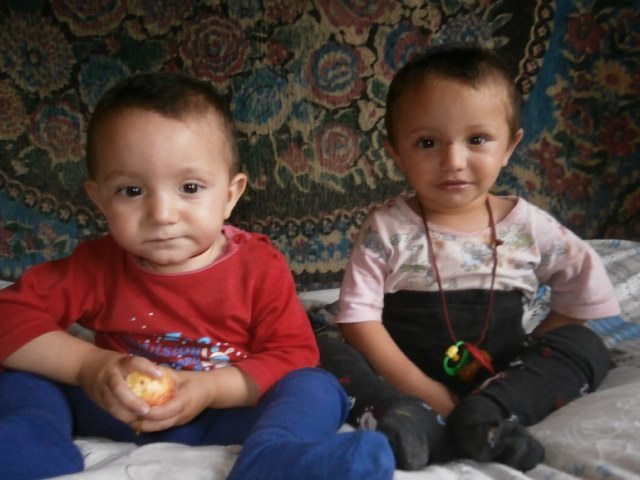
***
Lilly Torosyan: How did RMF get its start in Armenia?
Nairy Ghazourian: In 2007, I was invited to a fundraiser by my good friend, Dr. Anton Ambrose, who was a survivor of the 2004 tsunami. He was in Sri Lanka with his family when the tsunami happened and he lost both his wife and daughter in an instant. We became very close, like father and daughter. During the fundraiser for RMF, I was very inspired by the newly born organization’s work and the level of media coverage it had that night. I wanted to do something with this organization, but I was not sure what I could do.
Eight months later, one of the doctors I had met at the event phoned me and invited me to his home for a dinner party. That’s the night I met Dr. Fuchs and spent quality time talking with her and asking questions. One of RMF’s goals she mentioned was to be on all four major continents by 2010. At the time, RMF was already in Africa, India, Pakistan, Sri Lanka, but nowhere on the other side.
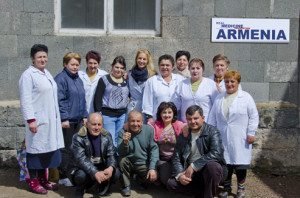
A week after that party, I felt a sudden inspiration in my gut, which I acted upon immediately. I called Dr. Fuchs and asked, “Would RMF be interested to work in Armenia?” I told her that I would do everything it takes to get the project going.
This was the germination and the birth of the idea. The work included many long months of planning, connecting to people, and fundraising. I come from a public health background and my entire career has been in healthcare, but when it came to healthcare in Armenia, I knew nothing. I reached out to various key informants in our community and with their direction and advice, we hired Dr. Alina Dorian, who completed our initial needs assessment, and we chose Shinuhayr in the Syunik region for several reasons: (1) It is a region where humanitarian aid is needed, and there isn’t much. (2) It is geopolitically a very important region, being at the border with Azerbaijan and Iran. (3) There is a great need there for primary healthcare.
I wanted Armenia to also be on the list of countries receiving RMF aid, and basically I wanted to build something where odars could talk about Armenia and Armenians.
LT: According to RMF’s website, the organization provides medical, emotional, economic, and social support to people living in disaster- and poverty-stricken areas. What services, specifically does RMF provide to Armenian villages?
NG: RMF reaches out to a community of 6,700 in Syunik. Shinuhayr is the main village [in Syunik], with the largest population of 3,500, and is in the center of the surrounding smaller seven villages we reach out to: Sevarantz, Harjis, Halidzor, Tatev, Khot, Tantzatap, and Kasheni.
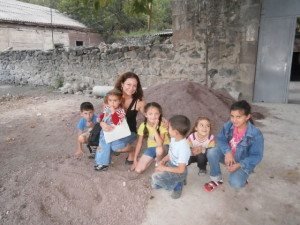
Shinuhayr serves as the primary healthcare “referral center” for the other villages. It is the only village with a physician, two head nurses, and a laboratory. The other villages only have first aid posts; therefore, Shinuhayr’s clinic is critical for the region.
For the past three years, RMF has and continues to provide free monthly medications to chronically ill patients, and education and follow-up with our nurses, to assure medication compliance. We also sponsor all vaccinations for children.
In 2010, we purchased an ambulance for the clinic so that patients can be transported in emergency situations and the doctor can make house calls to those patients who cannot come to the clinic.
We also identify children or adults with severe and critical illnesses and sponsor or arrange their hospitalization. In 2010, we provided perishable food to the 179 families in Shinuhayr to sustain them for 2.5 months.
LT: You have mainly worked in the Shinuhayr hospital in the province of Syunik. In what ways have the locals benefited from the help of RMF?
NG: When we first started our work, the locals were very cynical and suspicious. They did not believe that anyone would give anything for free, especially healthcare and medications. This is normal, because corruption has been widespread in the region. Patients were afraid to seek our help. This slowly changed, but it took a very long time to earn the people’s trust. Now, one behavioral change we’ve seen is that people actually seekcare. We’ve seen their trust grow, as well as their gratitude. It adds self-esteem to a population—that they matter and are receiving care from a fair system.
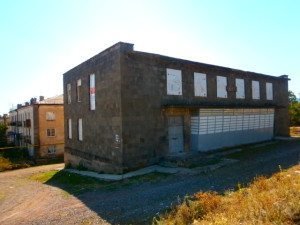
LT: What are your future goals for the organization in Armenia? Will other villages be added to the program, as well?
NG: Ever since the inception of this project in Armenia, I have volunteered my time as a country director and was responsible for everything from designing the programs, to writing reports, communicating with our implementation partner (the Armenian Relief Society) on the ground, and most importantly, raising the dollars to support the program.
After three years of hard-earned success, we decided it was time to move to the next level. This summer, I traveled to Armenia, where I had various meetings with key individuals. I visited all the villages and spent time with the people and the families we have reached out to. I listened to their stories, needs, and feedback. I also interviewed several strong candidates for the country director position. We found two very strong women with 10-12 years of non-profit and grant writing experience and a solid track record to execute the work. I am now in the midst of raising funds to hire them, so they can take this program to the next level by submitting grant proposals to various organizations, including USAID and UNICEF.
Our goal moving forward is to get the funding to refurbish Shinuhayr’s primary healthcare clinic, supply and maintain all the health posts in the seven surrounding villages, continue provision of medical supplies and pharmaceuticals, and add a whole new segment of aid via “economic development.”
Based on the grant amount we are awarded, we very much would like to expand our work to different villages or even regions in Armenia that are in dire need of our services.
LT: Can you please explain your current fundraising efforts? When is the deadline?
NG: This year, RMF partnered with Kinetra, an online fundraising agent, and we set a goal to raise $100,000 in 12 months to cover our project costs, including our two new directors we are bringing on board.
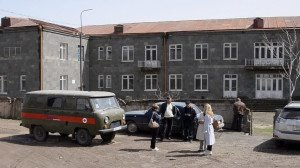
Over the past two years, we have been taking care of Mariam Tatevosyan’s palliative care with her spine. She was 14 when we took her on and she has severe scoliosis that has kept her even from ambulating proficiently. Mariam has been sponsored by RMF for monthly check-ups and X-rays, and is wearing a corset specially made for her to help prevent further curvature of the spine as her bones reach the maturity/growth where she can be a candidate for surgery. The corset was custom made for her every four months to accommodate her growth. And now, Mariam has reached her bone maturity and is ready for surgery. This is the critical time to have surgery before the bones set in. We need to raise $8,000 for her surgery and post-surgical rehab.
Melsik Ghazaryan suffers from high cholesterol, hypertension, and atherosclerosis—having suffered two heart attacks in the past three years. His condition requires immediate care with a cardiologist and an angioplasty, which he has not been able to get due to the cost. His condition is very time-sensitive and we need to raise $3,000.
So the immediate need to raise $20,000 by Thanksgiving is to cover: (1) 3 months operational costs/medications, $9,000; (2) Mariam’s surgery and rehabilitation care, $8,000; and (3) Melsik’s angioplasty and comprehensive cardiac tests, $3,000.
LT: Several other fundraising events have been planned for the coming months.
NG: Yes, Team Armenia has participated in the Los Angeles Marathon for two years now and every year, we outdo ourselves. In 2010, we raised over $5,000 and Team Armenia decided to donate half of it to the Japan Tsunami fund via RMF. Last year, we raised $6,000 out of the $15,000 RMF had collected from all countries.
This year, there is a new incentive: Anyone who raises $12,000 gets to pick from the countries listed below (Armenia included), where airfare and lodging will be included.
On Nov. 16, Kavar restaurant in Hollywood has offered their services to host a Thanksgiving dinner for 130 individuals to raise funds and awareness for RMF’s projects in Syunik. There will be entertainment, art, and dancing. Tickets are $55 per person.
For more information about RMF Armenia, visit http://www.realmedicinefoundation.org.
For more information on the Thanksgiving event at Kavar, visit www.itsmyseat.com/rmf.


May God bless Nairy Ghazourian and the family who raised her to be such a capable, generous and hayrenaser person.
Antoine S. Terjanian, Yeghegnadzor